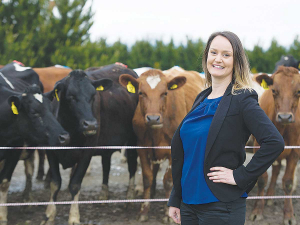A glimmer of hope for the country's dairy farmers under siege from a myriad negative challenges including rising input costs, interest rates, state-sponsored regulations and falling commodity prices.
Rabobank senior agri analyst, Emma Higgins told Dairy News that it appears there may be some sort of silver lining coming up later this year and into next year.
Her remarks breathe some hope into a situation where a recent survey by the bank shows that dairy farmers are more pessimistic than ever about the broader agri economy. Higgins says it's not just the high-level issues that are affected dairy farmer morale, but also the problems they are encountering on their farms such as labour issues and adverse weather events.
But Higgins says there are signs of better things to come.
"I think what we are potentially going to see is more positive margins for dairy farmers in the new season, such as respite on the farm input cost side of things. We are seeing, for example, fertiliser prices lower in response to global benchmark prices and we are expecting to see improved commodity prices come through in the second half of this year," she says.
Higgins says there are signs of demand coming from China, but the hope is that overall demand for dairy products will increase as well. But she adds that there are still some potential challenges ahead with NZ, Europe and the USA increasing their milk production.
"What we are seeing out of the northern hemisphere is that they are moving towards their season milk curve so they are really starting to hit their straps over the coming weeks. As a result, we are seeing some improved milk production come out of the EU and the US and so any surplus milk could add pressures on global dairy prices," she says.
The other side of the equation is that grain prices may continue to rise due to the war in Ukraine and that will affect input costs in Europe. But while there is potentially some good news on the horizon, dairy farmers remain down in the dumps, and it will take more good news to lift their morale.


















